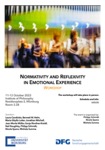Workshop "Normativity and Reflexivity of Emotional Experience"
11-13 October, 2023
Our experience of many – if not most – situations, of other people, and of ourselves is shaped by emotions. We greet someone with joy or surprise, we feel shame because of our casual outfit in an official meeting, we are annoyed if someone comes too close, we have a somewhat melancholic mood entering a cemetery, etc. In these and similar situations, emotions and feelings are typically not simple add-ons to an otherwise emotionally neutral experience. Rather, emotions make up our experience of that given situation. It is often through emotions that we become aware of what matters and what is more or less significant to us, as well as of what we are concerned and care about.
How emotions shape our experience is not always straightforward and clear. They stand out as particular kinds of experiences that overcome us: we do not decide to feel embarrassed or joyful in a certain situation, it rather happens to us to feel this way. But even when we feel passively arising emotions, we can and often do recognize and appreciate their appropriateness or inappropriateness. Some feelings may seem understandable. Sometimes it seems we shouldn’t enact and embody the feelings that accrue in us. Such an assessment is often understood as deriving from a form of cognitive reflection: we think about our emotional experience and find it more or less matching with our judgment. However, this cognitive and rationalizing assessment and ex-post evaluation does not seem to be the only way in which we appreciate the appropriateness or inappropriateness of our emotions. In fact, even while undergoing an emotional experience, we may develop feelings that tell us our immediate emotional response is inappropriate. Such a feeling of inappropriateness is indeed what gets us to reflect on our emotional experiences and their reasons or motives. Emotional experience itself, in other words, seems to bear a sui generis, non-cognitive reflexive structure in which a primal and weak sense of normativity is rooted.
Questions related to the normativity of emotions are of crucial importance in contemporary ethics. Unlike the strong normativity of imperatives, the normativity of emotions is weak to the extent that it relies on a felt sense of appropriateness, which is also culturally conditioned and which precedes explicit justification. The discussion of the relation between ethical demands and the weak normativity of emotions would profit from an inquiry into the briefly sketched primal structure of reflexivity in emotional experience. Are approval and disapproval of emotional experience cognitive in nature? And is the reflexivity of emotion grounded in cognitive activity? Or is it more accurate to understand approval and disapproval of emotional experience in purely affective terms? Should we, in the end, look for the sources of normativity within emotional life itself?
The aim of this workshop is to examine the intentional structures underlying these forms of reflexive weak normativity, which are intrinsic to the experience of emotions, as well as their ethical and social implications. Topics for contributions include, but are not limited to: the structure of emotional reflexivity, the specific kind of normativity of approval and disapproval, specific emotions that bring such weak normativity to the fore, the ethical relevance of this kind of reflexivity, the way in which such reflexivity contribute to shaping oneself and one’s interpersonal relationships, etc.



